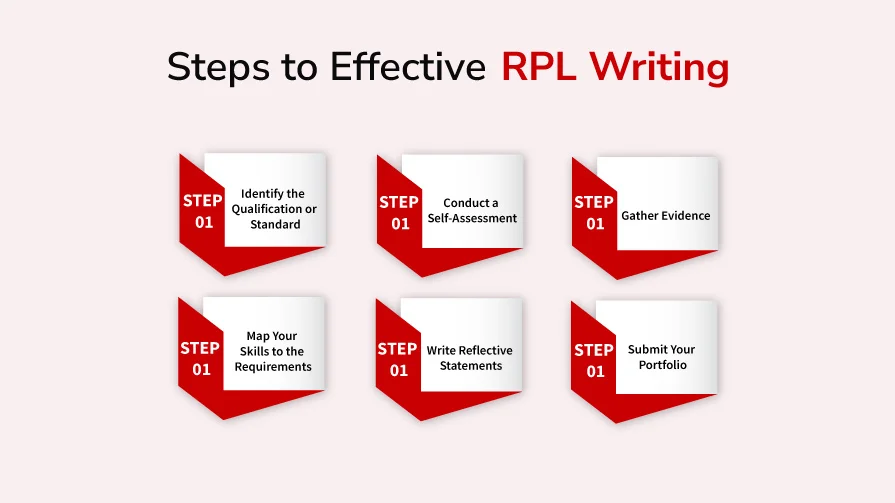Benefits of RPL Writing for Professional Advancement—Seize the Opportunity!
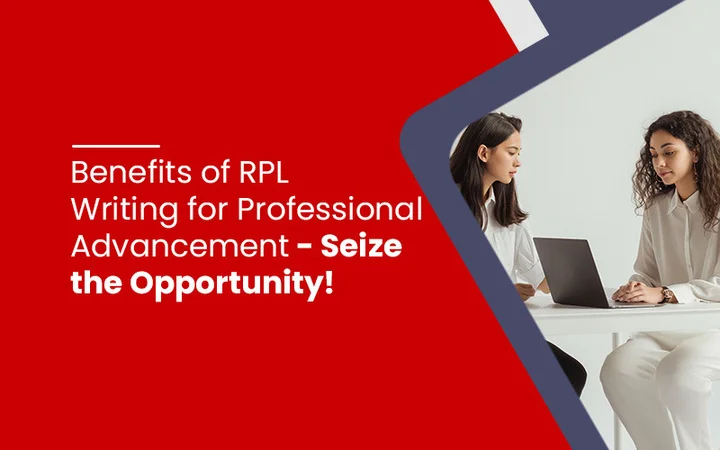
Benefits of RPL Writing for Professional Advancement—Seize the Opportunity!
In today’s competitive job market, continuous learning and upskilling are essential for career advancement. Formal qualifications are often seen as a gateway to new opportunities, but what if you possess valuable skills and experience that are not reflected on paper?
So, in today’s fast-paced professional world, continuous learning and skill validation are crucial. This is where Recognition of Prior Learning (RPL) comes in. Recognition of Prior Learning (RPL) is an excellent way to showcase your skills, whether acquired through formal education or hands-on experience for migration to Australia.
RPL Writing for Professional Advancement allows you to translate your existing knowledge and experience into a recognized qualification, boosting your credibility and opening doors to a brighter future in Australia. Whether through formal education, work experience, informal learning, or life experiences, RPL writing can be your ticket to new career heights.
RPL acknowledges your hard-earned expertise and opens doors for career advancement. This blog explores the numerous benefits of RPL writing for professional advancement and how you can use this opportunity to boost your career.
Understanding RPL Writing
Recognition of Prior Learning (RPL) allows individuals to gain formal recognition for the skills and knowledge they have acquired outside traditional educational systems. This could be from work experience, on-the-job training, or self-study and likewise, such as:
- Formal Education
Includes previous courses, certificates, and diplomas.
- Work Experience
Covers on-the-job training, involvement in projects, and demonstration of skills.
- Informal Learning
encompasses workshops, self-directed learning, and industry conferences.
- Life Experiences
Involves volunteer work, community involvement, and transferable skills.
Since, this acknowledgment comes from a variety of learning experiences, whether formal, informal, or experiential, RPL writing services involve documenting and presenting this learning in a way that meets the specific criteria of educational institutions, professional bodies, or employers.
By doing so, it allows individuals to gain formal recognition for their competencies, potentially bypassing the need for traditional education pathways.
RPL writing involves documenting and presenting this learning in a structured way to meet the requirements of educational institutions, professional bodies, or employers.
RPL offers a valuable opportunity to bridge the gap between your existing expertise and formal qualifications. It is particularly beneficial for those with extensive experience in their field but who lack traditional educational credentials.
This acknowledgment can come from a variety of learning experiences, whether formal, informal, or experiential. RPL writing involves documenting and presenting this learning in a way that meets the specific criteria of educational institutions, professional bodies, or employers.
By doing so, it allows individuals to gain formal recognition for their competencies, potentially bypassing the need for traditional education pathways.
What is RPL Writing for Professional Advancement?
RPL writing for professional advancement is about formally recognizing the skills and knowledge you’ve gained through various experiences to enhance your career.
This involves creating a detailed portfolio that shows your competencies and aligns them with the requirements of a specific qualification or professional standard.
Think of it as a bridge that connects your informal learning with formal recognition. It allows you to convert your practical experience into academic credits or professional certifications, opening up new opportunities for career progression.
This process is incredibly valuable, especially if you’ve gained substantial experience in your field but lack formal educational credentials. By documenting your expertise, you can gain academic credits or professional certifications, thus opening up new opportunities for career advancement.
Why is RPL Writing Important for Professional Advancement?
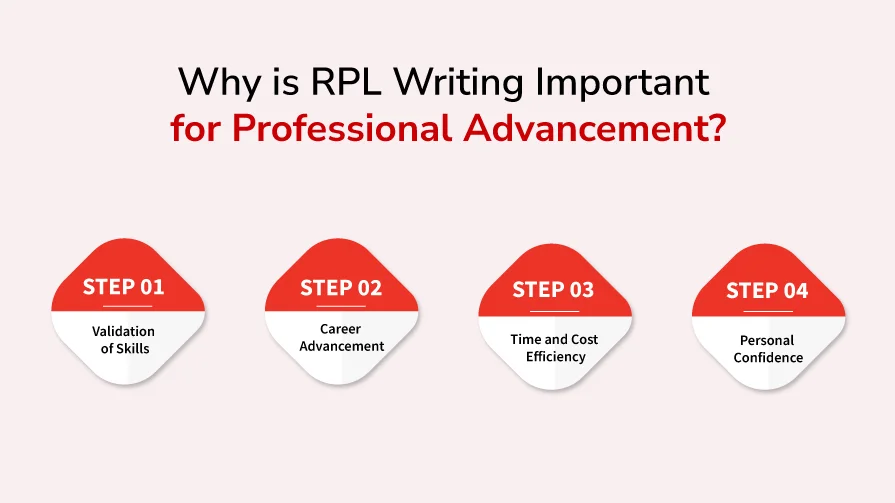
RPL writing, the process of documenting your skills and experience for RPL assessment, offers a multitude of benefits for professional advancement. Here’s how RPL can elevate your career:
-
Validation of Skills
It provides a formal acknowledgment of your expertise, which is especially beneficial if you lack traditional academic qualifications.
-
Career Advancement
With formal recognition, you can qualify for promotions, new job roles, or higher education opportunities.
-
Time and Cost Efficiency
RPL can save you time and money by reducing the need to complete courses for skills you already possess.
-
Personal Confidence
Knowing that your skills are officially recognized can boost your confidence and motivate you to pursue further professional development.
Key Benefits of RPL Writing for Professional Advancement
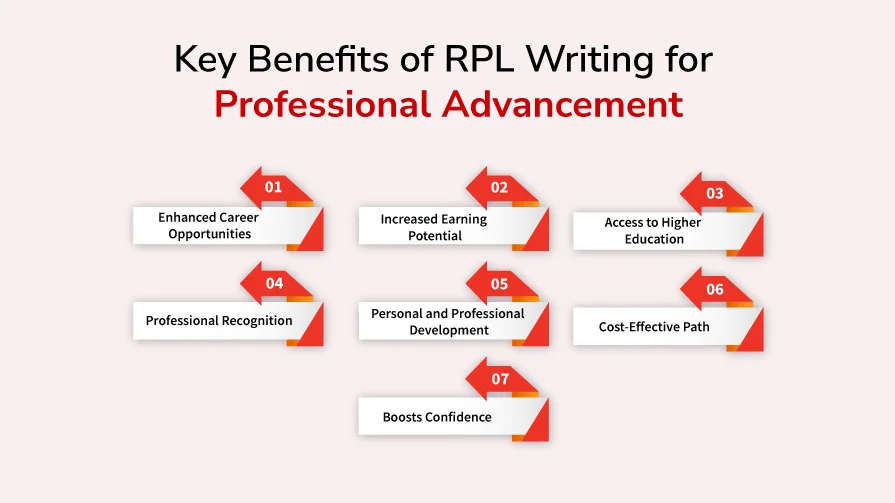
RPL writing offers many benefits that can significantly impact your professional journey. Here are some key advantages:
A. Enhanced Career Opportunities
One of the main benefits of RPL writing for ICT business analysts is that it enhances career opportunities, by formally recognizing your skills, you become eligible for positions that require specific qualifications or certifications. This can lead to promotions, job changes, or even new career paths.
For instance, imagine you’ve been working in IT for several years, but your lack of a formal degree is holding you back from a managerial position. Through RPL, you can document your on-the-job experience, projects you’ve led, and technical skills you’ve mastered.
This portfolio can then be assessed against the requirements of an IT management qualification, potentially earning you that degree and making you eligible for the promotion.
B. Increased Earning Potential
With formal recognition of your skills, you can negotiate better salaries and benefits. Employers often offer higher compensation to individuals who have demonstrated their expertise through recognized qualifications.
When your skills are officially validated, it provides a stronger case for why you deserve a raise or a higher starting salary in a new job.
C. Access to Higher Education
RPL assessment can open doors to higher education by providing you with academic credits for your prior learning. This can reduce the time and cost required to complete a degree or other qualifications, making it easier for you to pursue further studies.
For example, if you’ve acquired substantial business management experience, RPL could allow you to bypass certain modules of an MBA program, letting you complete the degree faster and at a lower cost.
D. Professional Recognition
Being formally recognized by professional bodies or industry associations can enhance your professional credibility. This recognition can be a significant asset in fields where certification and professional standards are highly valued.
It’s not just about having a certificate; it’s about being seen as an expert in your field by your peers and superiors.
E. Personal and Professional Development
The process of RPL writing encourages self-reflection and a deeper understanding of your skills and knowledge. This can lead to personal growth and inspire you to continue your professional development journey.
As you compile your portfolio, you’ll have the chance to look back at your career, recognize your achievements, and identify areas for future growth.
F. Cost-Effective Path
Compared to enrolling in a full course, RPL can be a more economical way to reach your career objectives. You only pay for the assessment process, not for redundant learning you already have.
G. Boosts Confidence
Completing RPL writing and Document checklists can greatly boost your confidence and self-esteem. Recognizing your knowledge, process, and skills through this process empowers you to take on greater challenges.
Steps to Effective RPL Writing
RPL writing experience requires careful planning and execution to ensure your skills and knowledge are effectively demonstrated. Here are the key steps involved in the process:
A. Identify the Qualification or Standard
First, identify the qualification or professional standard you aim to achieve. Understand the specific requirements and competencies that need to be demonstrated.
This involves researching the qualification thoroughly, understanding the assessment criteria, and knowing exactly what evidence is required.
B. Conduct a Self-Assessment
Conduct a thorough self-assessment to identify the skills and knowledge you’ve acquired through various means. This will help you determine the areas where you need to focus your RPL writing efforts.
Reflect on your work experiences, education, training, and any other relevant activities. Make a list of your skills and match them against the qualification requirements.
C. Gather Evidence
Collect evidence to support your claims of prior learning. This could include work samples, certificates, references, performance reviews, and any other documentation that demonstrates your competencies. The more comprehensive your evidence, the stronger your RPL portfolio will be.
D. Map Your Skills to the Requirements
Create a detailed portfolio that maps your skills and knowledge to the specific requirements of the qualification or standard. Clearly explain how your experience aligns with each competency.
Use a systematic approach to match your evidence with the required criteria. This might involve writing detailed descriptions of your experiences and how they relate to each competency.
E. Write Reflective Statements
Include reflective statements that describe your learning journey, the context in which you acquired your skills, and how you have applied them in your professional practice.
Reflective writing is a critical component of RPL. It not only shows what you’ve learned but also demonstrates your ability to think critically about your experiences and how they’ve contributed to your professional growth.
F. Submit Your Portfolio
Submit your RPL portfolio to the relevant educational institution, professional body, or employer for assessment. Be prepared to provide additional information or evidence if required.
The submission process can vary, so make sure you follow the specific guidelines provided by the assessing body. After submission, there may be an interview or additional verification steps.
Common Challenges of RPL Writing and How to Overcome Them?
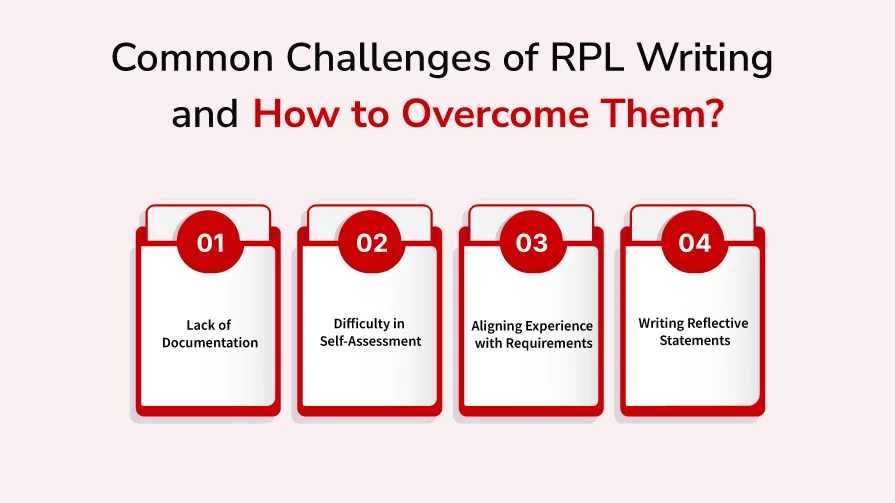
RPL writing can be complex and demanding. Here are some common challenges and tips on how to overcome them.
A. Lack of Documentation
One of the biggest challenges in the RPL writing process is the lack of adequate documentation to support your claims. Start gathering evidence early and keeping a record of your achievements and experiences.
If you don’t have certain documents, consider alternative evidence, such as testimonials from colleagues or detailed descriptions of your work.
B. Difficulty in Self-Assessment
Accurately assessing your skills and knowledge can be challenging. Seek feedback from colleagues, mentors, or supervisors to gain a more objective perspective.
Use tools like self-assessment questionnaires and skills audits to help you identify your strengths and areas for improvement.
C. Aligning Experience with Requirements
It can be difficult to map your informal learning to the specific requirements of a qualification or standard. Take the time to thoroughly understand the requirements and seek guidance if needed.
Professional advisors or mentors can provide valuable insights on how to align your experience with the required competencies.
D. Writing Reflective Statements
Writing reflective statements can be daunting, especially if you are not used to reflective writing. Practice writing about your experiences and seek feedback to improve your reflective writing skills.
Use a structured approach: describe the experience, reflect on what you learned, and explain how you applied this learning in your professional practice.
Case Studies: Success Stories of RPL Writing
To illustrate the impact of RPL writing on professional advancement, let’s look at some success stories:
Case Study 1: Sarah’s Journey to Becoming a Chartered Accountant
Sarah had been working as an accountant for over a decade but did not have a formal accounting qualification. Through RPL writing, she was able to demonstrate her extensive experience and gain recognition as a chartered accountant. This boosted her professional credibility and opened up new career opportunities.
By compiling a comprehensive portfolio that included work samples, client testimonials, and detailed reflective statements, Sarah successfully mapped her skills to the requirements of the Chartered Accountant qualification.
Case Study 2: John’s Path to a Project Management Certification
John had extensive experience in project management but lacked formal certification. By documenting his skills and knowledge through RPL writing, he obtained a recognized project management certification. This allowed him to secure a higher-paying job and take on more challenging projects.
John’s portfolio included project plans, risk assessments, and feedback from team members, demonstrating his ability to manage complex projects effectively.
Case Study 3: Maria’s Recognition in the Healthcare Sector
Maria had worked as a nurse for many years but had never completed a formal nursing degree. Through RPL, she was able to have her practical experience recognized, which earned her a formal nursing qualification. This not only improved her job security but also enabled her to pursue further specialization in her field.
Maria’s portfolio highlighted her clinical skills, patient care experiences, and contributions to healthcare teams, providing a comprehensive picture of her competencies.
Tips for Successful RPL Writing
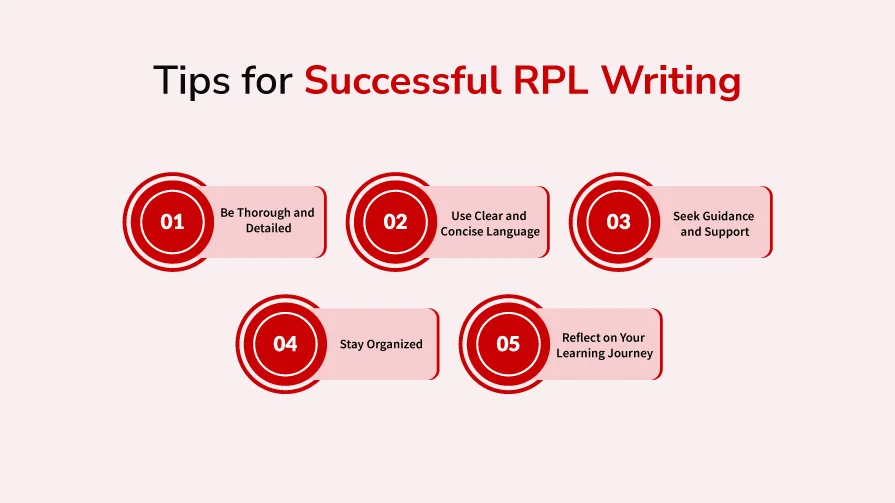
Here are some tips to help you succeed in your RPL writing journey:
A. Be Thorough and Detailed
Provide detailed evidence and explanations to support your claims. The more thorough you are, the stronger your RPL portfolio will be. Don’t assume that the assessor will understand your skills without clear, detailed descriptions and evidence.
B. Use Clear and Concise Language
Use clear and concise language to describe your skills and experiences. Avoid jargon and ensure your writing is easy to understand. Clear communication is key to effectively conveying your competencies to the assessors.
C. Seek Guidance and Support
Don’t hesitate to seek guidance from mentors, colleagues, or professional bodies. They can provide valuable insights and feedback to strengthen your RPL portfolio. Professional advisors or RPL coordinators can offer specific advice on how to compile and present your portfolio.
D. Stay Organized
Keep your evidence and documentation well-organized. This will make it easier to compile your RPL portfolio and ensure you don’t miss any important information. Use folders, spreadsheets, or digital tools to track your progress and keep all your documents in order.
E. Reflect on Your Learning Journey
Take the time to reflect on your learning journey and how it has shaped your skills and knowledge. This will help you write more meaningful and impactful reflective statements.
Reflective writing not only demonstrates your competencies but also shows your ability to think critically and learn from your experiences.
Future Trends in RPL Writing for Professional Advancement
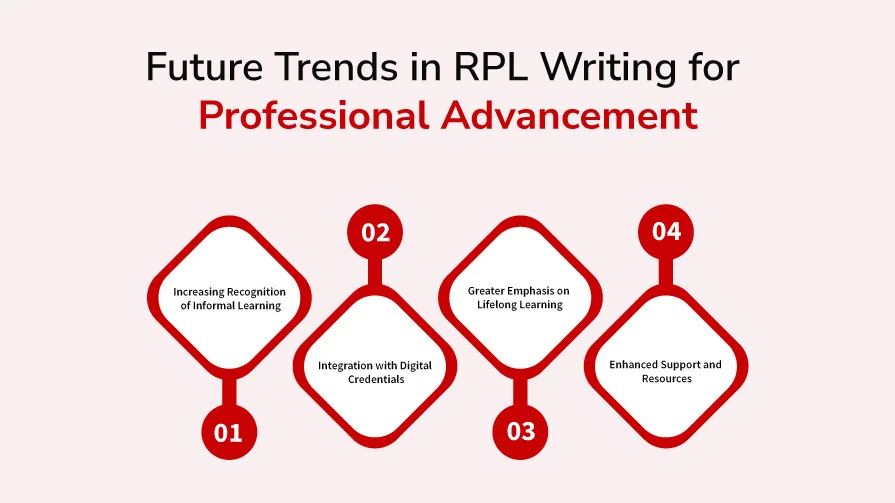
As the professional landscape continues to evolve, RPL writing is likely to become even more important. Here are some future trends to watch out for:
A. Increasing Recognition of Informal Learning
There is a growing recognition of the value of informal learning in the professional world. This trend is likely to continue, with more organizations and institutions adopting RPL processes.
As the lines between formal and informal learning blur, RPL will become a crucial tool for validating diverse learning experiences.
B. Integration with Digital Credentials
Digital credentials and badges are becoming more popular as a way to recognize and showcase skills. RPL writing can be integrated with these digital credentials to provide a more comprehensive and verifiable record of your skills.
Digital badges can be easily shared on professional networks like LinkedIn, enhancing your visibility and credibility.
C. Greater Emphasis on Lifelong Learning
The concept of lifelong learning is gaining traction, with individuals expected to update their skills throughout their careers. RPL writing for ICT will play a crucial role in enabling individuals to gain recognition for their ongoing learning efforts.
As industries evolve, the ability to continuously validate and recognize new skills will be essential.
D. Enhanced Support and Resources
As the demand for RPL increases, more resources and support will become available to help individuals navigate the RPL process. This could include online tools, templates, and guidance from professional bodies.
Enhanced support will make RPL more accessible and manageable for individuals from diverse backgrounds.
Conclusion
RPL writing for professional advancement is a powerful tool that can open up new opportunities and enhance your career prospects. By formally recognizing your skills and knowledge, you can gain access to better job roles, higher salaries, and further education opportunities.
The process of RPL writing for professional advancement requires careful planning, thorough documentation, and reflective thinking, but the benefits are well worth the effort. Seize the opportunity to advance your career through RPL writing and take the next step towards achieving your professional goals. You can also get help from online RPL samples for better writing.
RPL is more than just a process; it’s a pathway to acknowledging the value of your experiences and leveraging them for future success. Whether you’re looking to validate years of work experience, transition into a new role, or pursue further education, RPL writing can be the bridge that connects your past achievements with your future aspirations.
Embrace the opportunity, invest in your professional development, and watch as doors open to new and exciting career possibilities.
FAQs
What is Recognition of Prior Learning (RPL) and how does it work?
Recognition of Prior Learning (RPL) is a process that evaluates your current skills, knowledge, and experiences against the requirements for a formal qualification. It involves creating a portfolio of evidence, such as work samples, certificates, and references, to demonstrate your competencies.
An educational institution or professional body (ACS) then reviews this portfolio to determine if you meet the qualification criteria, potentially allowing you to bypass traditional coursework.
Can RPL help me if I want to switch careers?
Yes, RPL can be especially useful if you want to switch careers. It allows your existing skills and knowledge to be recognized, even if they were gained in a different field. By demonstrating how your transferable skills meet the criteria of a new qualification, RPL can help you transition into a new career more smoothly and efficiently.
This process can save time and money by reducing the need for extensive retraining and making it easier to move into a new professional domain.
How does RPL benefit professionals with extensive work experience but no formal qualifications?
RPL benefits professionals with extensive work experience but no formal qualifications by providing official recognition of their skills and knowledge. This formal validation enhances professional credibility, makes individuals more competitive in the job market, and often qualifies them for career advancements and higher salaries.
Is RPL writing only for those who lack formal education?
No, RPL writing is not only for those who lack formal education. It can also benefit individuals who have formal qualifications but want to gain additional recognition for skills and knowledge acquired through work experience, informal learning, or life experiences.
It’s a way to complement existing qualifications and further enhance professional credentials.
What kind of support is available for individuals undertaking the RPL process?
Support for individuals undertaking the RPL process includes guidance from mentors, professional advisors, and RPL coordinators. Many institutions offer resources, such as templates, checklists, and workshops, to help candidates compile their portfolios.
Seeking feedback from colleagues and supervisors can also provide valuable insights and improve the quality of the RPL submission.
Can RPL be used for partial qualifications or just full qualifications?
RPL can be used for both partial and full qualifications. Individuals can apply for RPL to gain credit for specific modules or units within a qualification, which can reduce the overall time and cost required to complete the full qualification.
This flexibility makes RPL an attractive option for those looking to fill gaps in their education or complete a qualification more efficiently.
How long does the RPL process typically take?
The duration of the RPL process can vary depending on the complexity of the qualification and the amount of evidence required. On average, it can take a few weeks to several months.
Factors influencing the timeline include the candidate’s preparation, the thoroughness of their portfolio, and the assessment process of the institution or professional body. It’s advisable to start the process early and maintain regular communication with the assessing body to ensure a smooth and timely evaluation.

